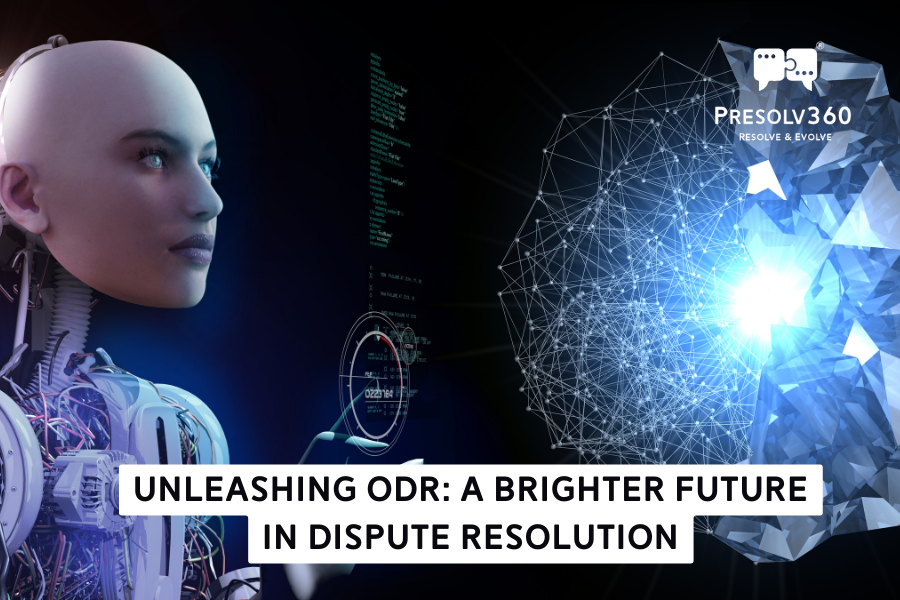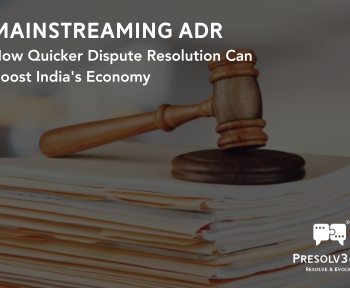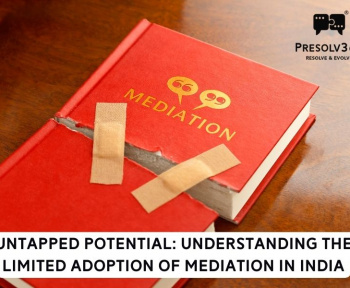Disputes are inevitable in human interaction, occurring in various domains such as commerce, employment, family, and more. Traditional methods of dispute resolution, such as litigation and arbitration, often come with high costs, lengthy proceedings, and limited accessibility. However, with the advent of Online Dispute Resolution (ODR), a new era of resolving conflicts has emerged. ODR is revolutionizing the field of dispute resolution and it holds immense promise for a brighter future.
What does ODR mean?
Online Dispute Resolution (ODR) is a continuously developing concept. In essence, it refers to the utilization of information and communication technology (ICT) tools to facilitate dispute resolution between parties. This involves employing a range of communication technologies, from telephones to smartphones to LED screens, as well as applications like spreadsheets, email, and messaging platforms. The primary objective of ODR is to enable dispute resolution without the physical gathering of the parties involved.
In its initial phase, ODR shares fundamental similarities with Alternative Dispute Resolution (ADR) methods such as negotiation, mediation, and arbitration. Early efforts in ODR have largely replicated ADR processes by employing basic ICT tools.
However, it is important to note that ODR does not mean merely electronic ADR (e-ADR). In more advanced stages, ODR can even function as a fourth party by incorporating algorithmic assistance tools to aid parties in finding resolutions. These technologies can manifest as intelligent decision support systems, smart negotiation tools, automated resolution systems, and machine learning.
Eventually, ODR has the potential to provide customized dispute resolution processes tailored to specific parties and their disputes. By leveraging technology tools, we can design these tailored processes to achieve optimal dispute resolution for all parties involved.
Current Framework in India
In India, the current framework for ODR requires a governance structure for regulation. Relevant legislation includes the Arbitration and Conciliation Act, 1996, the Code of Civil Procedure, 1908, and the Legal Services Authorities Act, 1987, which governs ADR and Lok Adalats.
The Commercial Courts Act, 2015, introduced pre-litigation mediation, while the Companies Act, 2013, allows for mediation in company-related disputes. The Consumer Protection Act, 2019 establishes Consumer Mediation Cells, and the Information and Technology Act, 2000 addresses the technical aspects of ODR.
The Indian Evidence Act, 1872 recognizes electronic evidence, and the Supreme Court has allowed remote conferencing for arbitrator appointments and virtual hearings. Courts encourage the use of technology to reduce overcrowding.
Recommendations for ODR Implementation
ODR has the potential for application across a variety of sectors and opportunities. Here are some important steps to realize this potential:
Bridging the digital gap
To ensure the successful implementation of ODR in India, it is crucial to address the digital literacy gap among the population. Efforts should be made to reduce this gap and provide adequate digital literacy training to the citizens. Additionally, attention should be given to improving digital infrastructure, including access to computers, smartphones, and reliable internet connections for conducting ODR proceedings. Awareness campaigns should also be conducted to educate people about ODR and its benefits.

Regulatory framework
A regulatory framework is essential for ODR implementation because it provides a legal foundation and ensures fairness. Countries have passed legislation recognizing the enforceability of electronic contracts and ODR agreements, such as the ESIGN Act and UETA in the United States. ISO standards such as ISO 27001 and ISO 37301 provide recommendations on information security and compliance management. To secure sensitive information, data protection and privacy protections are incorporated. The enforceability of ODR agreements is emphasized, making them equal to traditional dispute resolution processes, and customer protection laws provide special measures for resolving customer complaints. Accreditation and certification may be necessary to ensure quality and conformity to ethical principles. For compliance, ODR stakeholders should review applicable legislation.
Pre-litigation mediation
Pre-litigation mediation is an excellent suggestion for ODR deployment. It entails intervening early to resolve issues before official legal actions begin. Pre-litigation mediation is inexpensive and quick, allowing parties to avoid the costs and delays associated with litigation. During mediation sessions, confidentiality is preserved, promoting open conversation. Its goal is to keep connections between parties intact, especially when continuing or future interactions are at stake. The process is facilitated by an unbiased mediator, who assists parties in reaching mutually acceptable solutions. Many countries support pre-litigation mediation, emphasizing its efficacy. Overall, pre-litigation mediation provides an efficient, private, and relationship-centred method of conflict resolution.
Standards and principles
Introducing an ideal set of standards and voluntary principles can promote the adoption of ODR among stakeholders. These principles can govern the technology and design of ODR platforms, as well as establish ethical obligations for ODR centres and neutrals. By adhering to these standards, the quality and effectiveness of ODR processes can be enhanced.
Strengthening the business environment
ODR has proven to be a catalyst for improving the ease of doing business in other countries. India can follow the example of the European Union, where merchants are required to inform customers about the availability of ODR. This facilitates stricter contract enforcement, leading to a more favourable business environment and increased investment in the country.
Conclusion
Embracing ICT innovations and ODR is a transformative step for improving dispute resolution in India. It creates a business-friendly environment, enhances accessibility, and streamlines the resolution process. Integration of AI and ML technologies opens new possibilities, improving efficiency and promoting legal health and awareness. The government’s proactive support and cautious approach are essential to maximize the benefits of these advancements and establish India as a leader in efficient and accessible dispute resolution.




